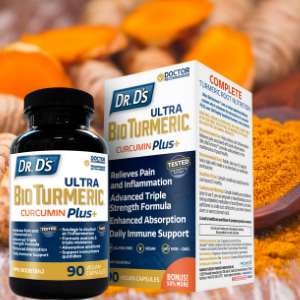
Dr. D’s Ultra BioTurmeric: Whole Root Nutrition
Share
More Than Just Curcumin…A highlight piece on Ar- turmerone
If you are already a turmeric consumer, you probably know about this ancient spice and its anti-inflammatory and antioxidant properties. You may have even heard all about how that translates into health benefits.
If you are not already a turmeric consumer, I invite you to review the list of the potential health benefits provided by turmeric:
- Supports cardiovascular health
- Provides neuroprotective activity
- Supports the immune system
- Supports gastrointestinal health
- Provides liver protective activity
- Supports muscle and joint health
- Lowers PSA (prostate-specific-antigen) levels
- Regulates blood glucose levels
The potential health benefits of turmeric are endless as we continue to research and unravel more and more therapeutic potential of this ancient powerful and natural anti-inflammatory.
Because of this, the turmeric supplement marketplace is saturated. Which is why both veteran turmeric consumers, and those new to us, will benefit from continuing to read this post as not all turmeric products are the same (hence why I used the term “potentially” in the list above).
Turmeric is very well known for “curcumin.” Turmeric and curcumin are often used interchangeably and are a source of common confusion. It is important to sort out any confusion before proceeding. Turmeric is an ancient spice that comes from the Curcuma longa plant. Curcuminoids, compounds extracted from the turmeric root, are important nutrients. Curcumin is the most important curcuminoid as it contains the greatest amount of medicinal properties. Curcumin is therefore a very special component of the entire turmeric root but is indeed not the same thing as turmeric.
What most people do not know is that curcumin (although very important, yes) only comprises 3 percent of the entire turmeric root! There are over 200 other disease-fighting compounds of the root… compounds that are missing from any turmeric product that does not comprise the whole root. Lastly, consuming the raw or whole turmeric root itself is great but is notoriously not absorbed well by the human gut (which is why proper supplementation is recommended).
One of those other powerful ingredients is called aromatic-turmerone (ar-turmerone, for short). This ingredient has also been shown to possess anti-inflammatory properties, but particularly in the signalling pathways of microglia.
Let’s take a step back to explain inflammation in order to really appreciate the benefits of turmeric, and its components such as ar-turmerone.
Inflammation is the immune system’s normal response to injury, toxins or infection. This short-term, or acute, inflammation is beneficial when it is under control, however, inflammation that persists longer is known as chronic inflammation. Chronic, persistent and systemic inflammation can be largely a consequence of lifestyle choices such as smoking, high intake of processed foods, high stress and environmental pollutants as these are all sources of toxins that our immune system continually tries to fight off. Chronic, persistent inflammation causes tissue destruction and scarring, reshaping of healthy or normal tissue, changes in gene expression, and much more. This maladaptive type of inflammation can be applied to any body system and is the source of all disease.
Now that you understand a little more about the immune system, let’s get back to microglia. Microglia are the immune cells of the nervous system. Picture “pacman” eating up harmful invaders. For whatever reason, as described above, something can spark chronic, persistent inflammation in the nervous system (specifically, the brain). The more maladaptive inflammation we have, the more havoc it can wreak on the carefully balanced system it is harbouring within. Microglia, for example, is a hallmark of neuroinflammation and is associated with various neurological diseases (dementia/Alzheimer’s and depression) and stroke. This means that ar-turmerone can actually stop any maladaptive inflammatory signalling cascade caused by microglia, so that they are left to function properly (ie. only target harmful invaders). Furthermore, research is showing that ar-turmerone may increase the number of neural stem cells in the brain, which play a role in the regeneration of tissue that has already been affected by neurodegenerative disease and stroke. Research has also shown that ar-turmerone has protective effects on hippocampal cells from any indirect neuronal toxicity induced by activated microglial cells. Hippocampal cells are found in the hippocampus, which is the part of the brain responsible for memory formation, and therefore associated with learning and emotion. There are also reports of ar-turmerone specifically having anti-fungal properties.
My hope here is that by learning a bit about what the research is telling us about Ar-turmerone -one of the hundreds of properties in the turmeric root OTHER than curcumin- is that you understand the importance of consuming a turmeric product which encompasses the WHOLE TURMERIC ROOT. If you are only taking curcumin, or are on a supplement that does not state that it is a full spectrum turmeric, you may be missing out on some of the health benefits listed in the beginning.
Dr. D’s Ultra BioTurmeric is a full spectrum turmeric supplement, providing the whole root, along with superior absorption, therefore unlocking turmeric’s full medicinal potential.
Source: